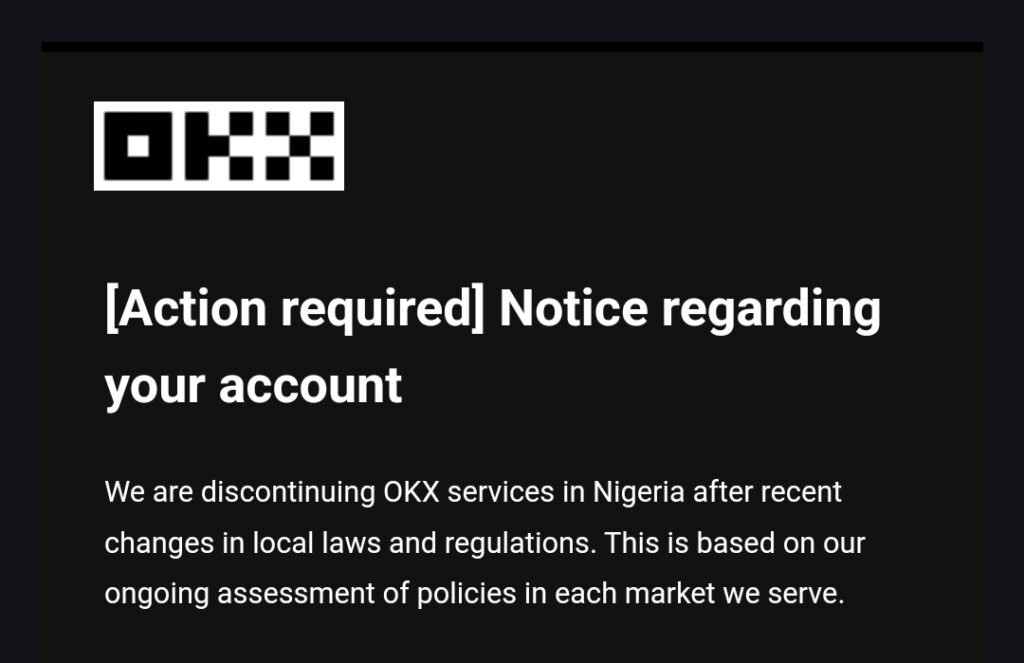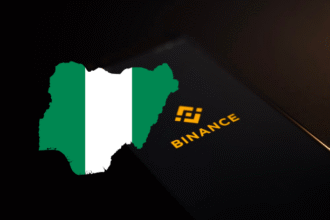OKX, a major global cryptocurrency exchange has announced its decision to cease operations in Nigeria, citing changes in local laws and regulations.
OKX becomes the third leading crypto platform to announce the discontinuation of services in the Nigerian market.
This begs the question of whether Nigeria is slowly becoming an unfavourable climate for crypto projects or do crypto companies perceive the emerging crypto regulatory guidelines and recently established taxes to be stringent.
The OKX-Nigeria development was contained in an email sent to customers on Wednesday. The crypto exchange announced that Nigerian users will no longer be able to open new trading positions or access their crypto trading services starting August 16, 2024. However, they will still be able to withdraw funds and close existing positions.

KYC services were disabled on the platform for Nigerian users in the previous week.
The countdown begins: Key dates for Nigerian OKX users
Beginning on August 16, 2024, OKX will halt all new trading activities and services for Nigerian accounts. From this date onward, users will be limited to withdrawing their assets or closing existing positions.
Another important date to note is August 30, 2024, which underscores the urgency for users to act proactively. By 8:00 am (GMT+1) on this day, OKX has advised Nigerian users to withdraw their funds to other crypto wallets or alternative exchange platforms. After this deadline, accessing accounts may become more challenging.
The bigger picture
OKX’s decision to leave the Nigerian market raises a big question: Are they trying to avoid new tax rules and regulatory requirements, or is Nigeria just not a good place for their business anymore? Is the regulatory landscape for cryptocurrency in Nigeria unclear?
Around the world, governments are trying to figure out how to deal with the nascent crypto industry. OKX leaving Nigeria might be a warning sign. Will other crypto companies take the same route?
Recall that Binance discontinued all Naira trading services in February 2024. As reported by Nitadel, Kucoin also suspended peer-to-peer (P2P) Nigerian Naira services in May 2024. Notably, several crypto exchange websites have been blacklisted by the Nigerian government.
While the government’s stances on cryptocurrency are motivated by concerns over money laundering, tax evasion, and Naira devaluation, its digital economy could be adversely affected if proper regulation is not put in place.
Kucoin resumes P2P and Naira services, introduces VAT
Interestingly, Kucoin has resumed P2P and naira services signalling compliance with Nigeria’s financial regulations.
“We are writing to inform you of an important regulatory update affecting our users in the Republic of Nigeria. Starting July 8th, 2024, we will collect a 7.5% Value-Added Tax (VAT) on transaction fees for users whose KYC information is registered in Nigeria,” the exchange said. “This VAT will apply to all transaction types on our platform, as required by Nigerian regulations,” it added.
For example, if a user buys $1,000 worth of Bitcoin (BTC) with a 0.1% fee rate, the transaction fee would be $1. The VAT on this fee would be 7.5%, or $0.075, resulting in a net transaction amount of $998.925.
Chimezie Chuta, the Founder and Coordinator of the Blockchain Nigeria User Group, confirmed this development to The PUNCH. He stated, “The implementation of VAT on crypto transactions by KuCoin signifies the Nigerian government’s recognition of crypto as an asset class. I see this as an acknowledgement of crypto as an asset class in Nigeria by the government. What is needed now is for FIRS to provide clarity on digital assets being VAT-able in Nigeria and to issue clear guidelines on the matter.”
SEC Amended Regulations for Digital Assets in Nigeria
The Securities and Exchange Commission (SEC) of Nigeria has amended its rules governing digital assets, set to take effect in June 2024. These changes aim to strengthen the regulatory framework for cryptocurrencies and other virtual assets in the country.
SEC’s so-called Accelerated Regulatory Incubation Programme (ARIP) requires Virtual Assets Service Providers (VASPs), including crypto brokers/dealers, to complete applications via the SEC e-Portal within the stipulated period.
Eligible entities must be incorporated in Nigeria, have a resident CEO or Managing Director, and demonstrate value propositions for the capital market’s development.
Other requirements include a sworn undertaking of integrity, operational plans and financial safeguards. A N2 million processing fee and proof of shareholder funds are mandatory.
ARIP participants must adhere to strict reporting obligations, including trading statistics and financial reports, with penalties starting at N5,000,000 and escalating for non-compliance, up to N20,000,000 for unauthorised operations. Successful participants will receive formal SEC registration after the ARIP period, contingent upon full compliance.
These amendments aim to streamline and clarify regulatory frameworks for virtual asset service providers in Nigeria, addressing emerging challenges and ensuring compliance with global best practices.
Impact on Nigerian Crypto Investors
This development is more than just one exchange exiting the market. It’s part of a broader trend that has seen other major players like Binance face regulatory challenges in Nigeria. For users, this means fewer options for trading and potentially more hurdles in accessing the global crypto market.
However, the crypto community in Nigeria remains resilient. Many see these restrictions as temporary setbacks rather than permanent obstacles. The demand for cryptocurrencies, driven by factors like currency devaluation and remittance needs, continues to be strong.
On the whole, the regulatory tightening in Nigeria contrasts sharply with the growing acceptance of cryptocurrencies in some other parts of the world. It raises questions about the future of crypto adoption in Africa’s largest economy and how this might affect Nigeria’s position in the global digital economy.






